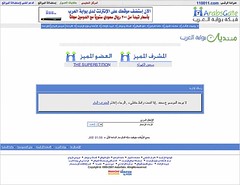
For some time, I have been of the view that cyberpunk hacker types, Southern California cathode ray fantasists, and Madison Avenue product placement pirates would be far more effective warfighters in a "Global War on Terror" than mechanized minions of the Pentagon. That it really is ultimately about culture and consciousness. That it's bona fide netwar. And that, you know, we'll know we've really won when there's a Hooters in Riyadh.

Today's NYT reports on the State Department finally getting into the act in a way that actually sounds potentially effective, after so many larger scale bombs and misses -- the unsuccessful recruitment of a Madison Avenue executive to improve America's global PR after 9/11, the US taxpayer-funded Presbyterian edition of Al Jazeera (dig those digitally enhanced wild horses!), the mysterious recruitment of comics professionals to create Arab-language superhero popaganda, and so on. Karen Hughes' (you thought she was back in Texas, didn't you) Public Diplomacy and Public Affairs office has started hiring bloggers:

At State Dept., Blog Team Joins Muslim Debate
By NEIL MacFARQUHAR
WASHINGTON — Walid Jawad was tired of all the chatter on Middle Eastern blogs and Internet forums in praise of gory attacks carried out by the “noble resistance” in Iraq.
So Mr. Jawad, one of two Arabic-speaking members of what the State Department called its Digital Outreach Team, posted his own question: Why was it that many in the Arab world quickly condemned civilian Palestinian deaths but were mute about the endless killing of women and children by suicide bombers in Iraq?
Among those who responded was a man named Radad, evidently a Sunni Muslim, who wrote that many of the dead in Iraq were just Shiites and describing them in derogatory terms. But others who answered Mr. Jawad said that they, too, wondered why only Palestinian dead were “martyrs.”
The discussion tacked back and forth for four days, one of many such conversations prompted by scores of postings the State Department has made on about 70 Web sites since it put its two Arab-American Web monitors to work last November.
The postings, are an effort to take a more casual, varied approach to improving America’s image in the Muslim world.
Brent E. Blaschke, the project director, said the idea was to reach “swing voters,” whom he described as the silent majority of Muslims who might sympathize with Al Qaeda yet be open to information about United States government policy and American values.
Some analysts question whether the blog team will survive beyond the tenure of Karen P. Hughes, the confidante of President Bush who runs public diplomacy. The department expects to add seven more team members within the next month — four more in Arabic, two in Farsi and one in Urdu, the official language of Pakistan.
The team concentrates on about a dozen mainstream Web sites such as chat rooms set up by the BBC and Al Jazeera or charismatic Muslim figures like Amr Khaled, as well as Arab news sites like Elaph.com. They choose them based on high traffic and a focus on United States policy, and they always identify themselves as being from the State Department.
They avoid radical sites, although team members said that jihadis scoured everywhere.
The State Department team members themselves said they thought they would be immediately flamed, or insulted and blocked from posting. But so far only the webmaster at the Islamic Falluja Forums (www.al-faloja.info) has revoked their password and told them to get lost, they said.
Not that they don’t attract plenty of skeptical, sarcastic responses. One man identifying himself as an Arab in Germany commented that they were trying to put lipstick on a pig. During Congressional testimony last week by Gen. David H. Petraeus, for example, the two-man team went into chat rooms to ask people their opinion.
“God bless America, the giving mother,” went one sarcastic response, going on to say that everything the United States does goes into “the balance of your pockets, I mean the balance of your rewards.” Another noted that Iraqis were better off before the invasion, while a third jokingly asked the Digital Outreach Team for a green card.
Mr. Jawad’s responses tend toward the earnest: “We do not deny that the situation in Iraq is difficult, but we are achieving success in decreasing the level of violence there with the contribution of the Iraqis who care about their nation and who reject the terrorists and killers who target their victims based on sect,” he wrote at one point. He directed the green card writer to the Web sites describing how to apply.
Mr. Jawad and his colleague, Muath al-Sufi, are circumspect about biographical details that would allow readers to pigeonhole them by their roots, religion or education. Mr. Jawad, would only say that he is in his 30s, was born in Texas and raised around the Arab world. Mr. Sufi also said he was in his 30s.
The team said certain topics repeated regularly, including arguments over the accusations that American soldiers tortured Iraqis at Abu Ghraib and President Bush’s comment that the fight against terrorism is a “crusade.” Much time is also spent trying to douse the Internet brush fires that erupt whenever prominent Americans from talk-show hosts to politicians make anti-Muslim remarks of the “bomb Mecca” variety.
Each response is carefully shaped in English by the team and translated into often poetic Arabic.
>>>
Wow. Government-authored war poetry. Makes me want to learn Arabic just to find out if that reads like a Cold War pamphlet rewrite of the Silmarillion.
Note they already have the perfect title for the first Robert Ludlum Blog Squad thriller: "PASSWORD REVOKED."
No comments:
Post a Comment